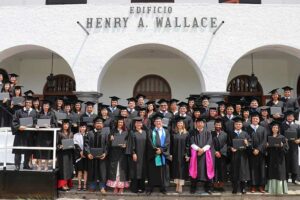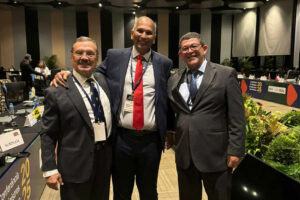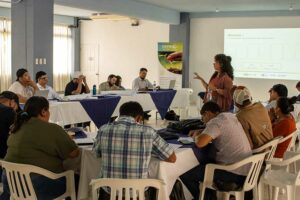Avocado Snack: An Innovative Opportunity for the Latin American Market
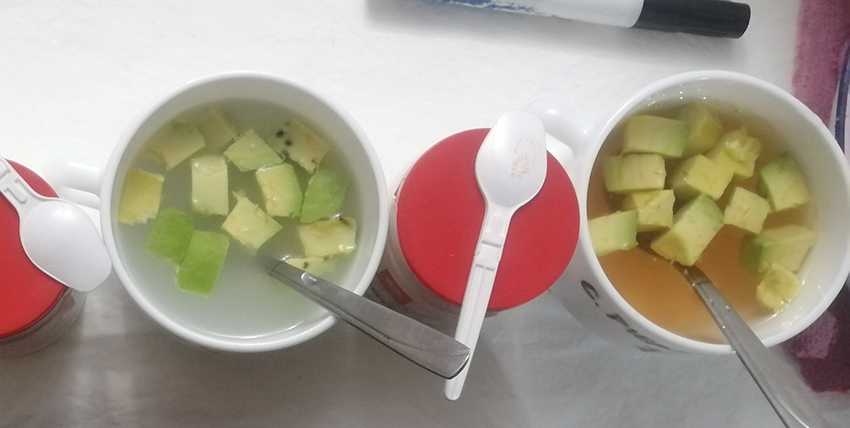
- This project was developed as part of the Master's in Agribusiness Management and Sustainable Markets (GANEMOS) and aligns with current trends in conscious and sustainable consumption.
Ana Pilaquinga, a GANEMOS master's student at CATIE, presented her thesis titled "Development of a Freeze-Dried Avocado Snack from the Hass Variety Produced in Pichincha, Ecuador." This represents an innovative project for the Latin American commercial sphere.

The research aims to address the global issue of food waste, noting that in 2019, Ecuador wasted 939,000 tons of food, costing $334 million. The development of a freeze-dried avocado snack could contribute to reducing such waste.
Pilaquinga highlights in her work the dynamics of the global avocado market, noting its constant growth driven by increasing demand from importers, led by the United States, the European Union, and China.
According to data from the Ministry of Agriculture of Ecuador, the country has significantly increased Hass avocado production, generating around $360 million annually. However, the research aims to address the substantial volume of rejection and its global significance.
Global avocado production is concentrated in Latin America and the Caribbean, contributing to nearly 60% of the marketed volume. In 2022, Mexico led with 30% of global production (2.442 million tons), followed by Colombia (979,000 tons), Peru (777,000 tons), and the Dominican Republic with 634,000 tons.
The research focused on the Pichincha Province, where 5,393 tons of avocados are produced annually, making it a strategic location for the development of the innovative freeze-dried snack.
Ana commented that exploring this topic allowed her to see that the market now seeks offerings not only of attractive-tasting products but also ones that address other needs, such as nutritional and environmental concerns. She stated, "This could become a global solution that we all contribute to in our market roles, creating new ideas that add value to traditional Latin American products and, at the same time, reducing waste percentages from our country."
The thesis presentation, the final requirement for obtaining her master's degree, was professionally supported by Wendy Alfaro, the graduation project director, Professor Adriana Escobedo, GANEMOS program coordinator, and Professor Lorena Gocho, director of the Master's in Food Development and Innovation at the University of the Americas in Ecuador.
A snack is a specific type of food consumed to temporarily satisfy hunger and can be considered synonymous with a snack or appetizer.
Nutritious and Sustainable Opportunity
Pilaquinga highlighted the nutritional composition of avocados, emphasizing their rich content in monounsaturated fatty acids and low levels of saturated fatty acids. The strategic choice with defined production cycles allows for stable prices in international markets.
Ana explained the methodology used to develop the snack, from generating the idea to creating prototypes and marketing. Lyophilization, a process combining freezing and drying, is projected as the key to preserving the natural composition of avocados.
A survey of 261 people in Quito revealed a high potential for snack consumers in the city, with 88.89% consuming such products. Of these, 59.39% preferred natural flavors.
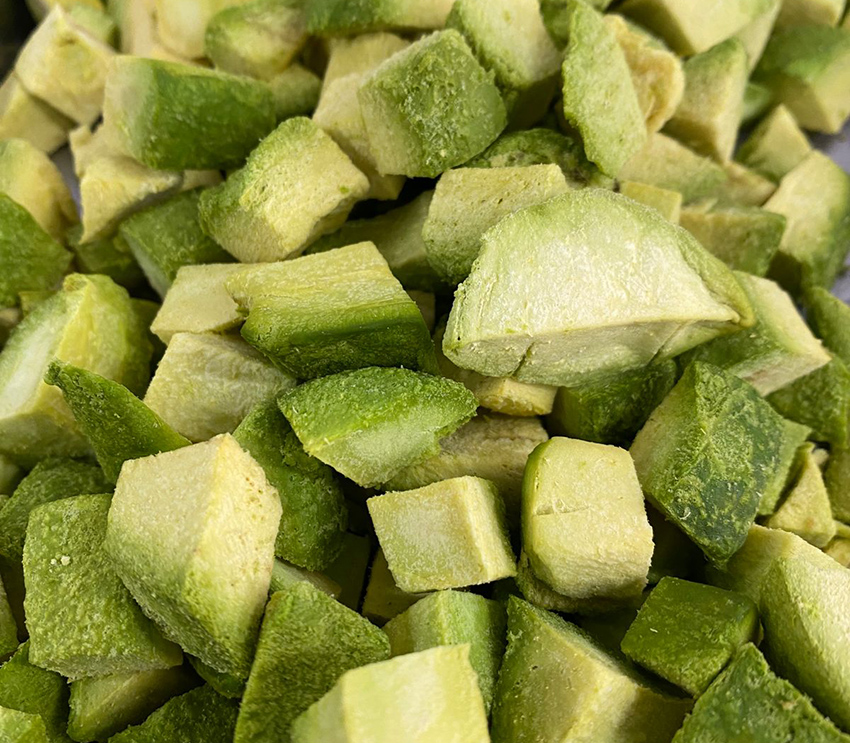
Considerations
In terms of conclusions, aspects such as taste, ripeness, and packaging were identified for further analysis in developing a product with high demand in the Ecuadorian market. Additionally, the potential to replicate similar processes for creating high socio-environmental value products from avocados in other regional producer countries was highlighted.
In the analysis of the experience, Ecuador's advantage in continuous avocado production was emphasized, suggesting the need to promote the development of new foods with benefits like reducing food waste. Future recommendations include market studies, cost optimization, and the creation of projects that add value to agricultural products.
Perspectives for the Latin American Market
The student concluded with promising results regarding the acceptance of freeze-dried avocado snacks, with 92.72% of respondents expressing interest in purchasing them, indicating a potential growing market.
The study emphasizes the need to educate consumers about lyophilization and its benefits. With the snack market projected to grow globally, innovative products like the one presented by Pilaquinga could not only meet market demands but also create new opportunities for avocado producers in Latin America.
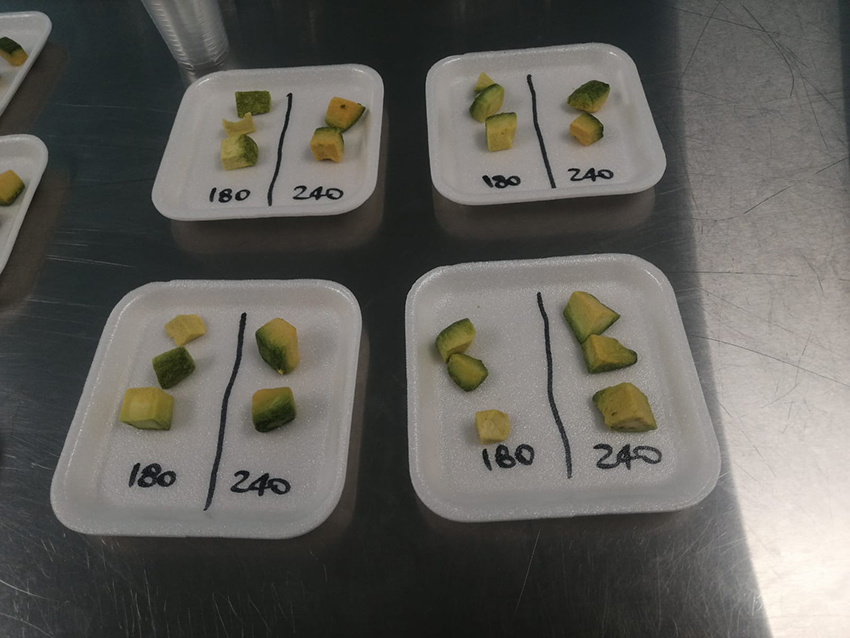
GANEMOS Master's Program
Ana concluded that her interest in studying the Master's program in Agribusiness Management and Sustainable Markets primarily focused on the alarming agricultural situation in her country. Despite having abundant natural resources, allowing it to play a crucial role in the economy by contributing an average of 9.63% to the GDP (Central Bank of Ecuador), this sector has not received the attention and proper management for sustainable growth. She mentioned, "The knowledge acquired allowed me to develop a product that adds excellent value to an item that currently goes unused in its entirety and is wasted."
The graduation thesis, focusing on the agricultural sector of rural parishes near the city, such as the well-known 'Hidden Route,' despite being close to the capital, Quito, and having an unparalleled variety of natural resources, its producers still face common agricultural problems.
"The graduation work will not stay only in the CATIE University documents, which provided me with a great opportunity for professional growth. I will work on modifications and the development of the investment project so that the avocado snack becomes a commercial reality," she concluded.
More information:
Adriana Escobedo
Unit of Environmental Economics and Sustainable Agribusiness
escobedo@catie.ac.cr
Written by:
Esteban Rodríguez Zamora
Communicator
Information Technology and Communication
CATIE
esteban.rodriguez@catie.ac.cr

